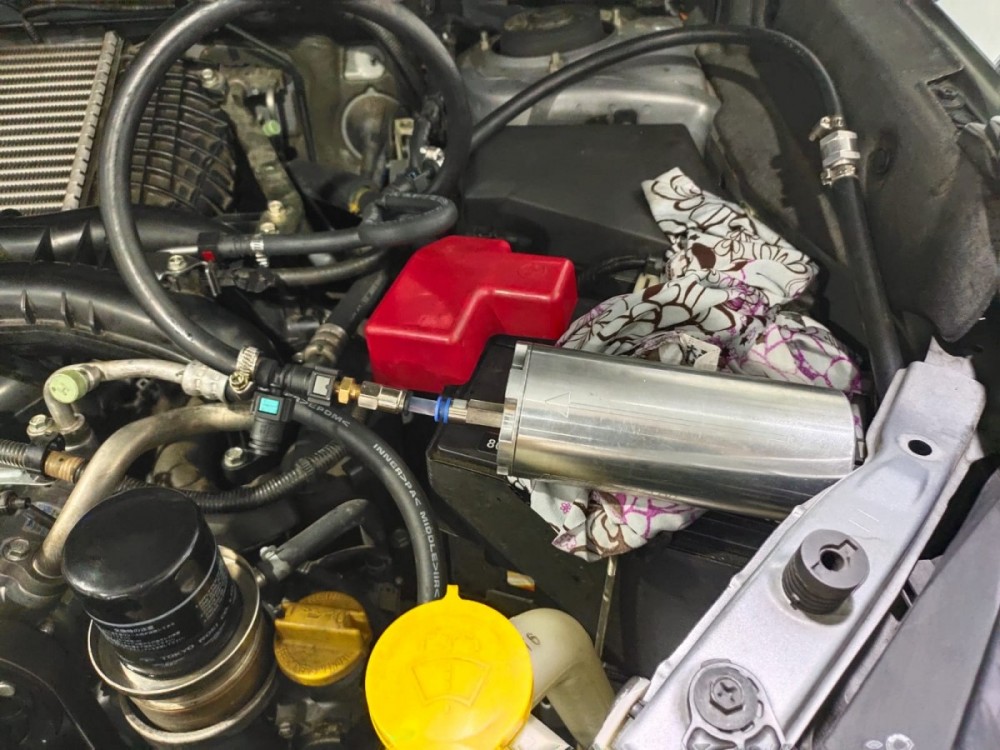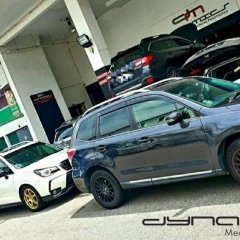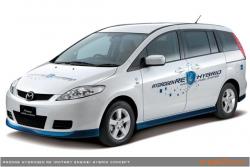Search the Community
Showing results for tags 'Hydrogen'.
-
Source: https://insideevs.com/news/685267/toyota-hilux-hydrogen-fuel-cell-prototype/ Toyota built its first Hilux Hydrogen Fuel Cell Prototype at its Burnaston vehicle plant in Derby, England. It is a joint project with consortium partners and was supported by UK government funding. The automaker intends to build 10 of them before the end of the year. This Hilux's powertrain uses parts from the Toyota Mirai. The automaker estimates that it has a range of 365 miles between hydrogen refills. For comparison, the Australian-market Hilux with the turbodiesel 2.8-liter engine can go about 715 miles (1,150 kilometers) between fill-ups. Images show that the hydrogen tanks fit between the frame rails roughly where the cabin fits. The other fuel cell components are under the hood, where the combustion engine usually is. The battery is at the rear. Toyota started this project in early 2022 as a feasibility study. Design and development began on July 1, 2022. The company started building a prototype on June 5, 2023. The automaker intends to put the 10 prototypes through testing to make sure the model lives up to the Hilux's rugged legacy. Toyota is prepping safety performance, functionality, and durability tests for them. The company wants to understand the opportunities and risks of a fuel-cell-powered pickup. In December 2022, Toyota showed off the electric Hilux Revo BEV Concept. The automaker didn't release any details about the truck at that time, like battery or motor specifications. During the presentation, Akio Toyoda said, "BEVs are not the only way to achieve the world’s carbon neutrality goals." Also in 2022, Toyota announced that it intended to build a light-duty pickup with a hydrogen fuel cell as a joint project with Isuzu and Hino. The company didn't specify a time frame for putting this model into production. Toyota is also considering whether to make a fuel-cell-powered version of the Land Cruiser. Plug-in hybrid and fully electric versions are also a possibility. At this point, it's not clear which, if any of these, would actually go into production.
-
Source: https://www.lowyat.net/2023/300587/japanese-brands-hydrogen-bike-engines/ Specifically Honda, Suzuki, Kawasaki and Yamaha, with Toyota being a "special member". When it comes to clean alternatives to fuel, much of the conversation is centred around electric vehicles (EVs). Every once in awhile, hydrogen engines come up, but these are usually talked about with regards to cars or larger vehicles. Four Japanese bike makers are looking to change that, as they have announced a research partnership for developing hydrogen-powered combustion engines for motorcycles. The research group is collectively known as the Hydrogen Small Mobility & Engine Technology (HySE), comprising of Honda, Suzuki, Kawasaki and Yamaha. Beyond the four, Kawasaki Heavy Industries and Toyota are also included as special members of the association, which has been granted approval by the Japanese Ministry of Economy, Trade and Industry. Each of the four companies also have their roles within HySE quite clearly defined. As per the press release by Honda, the company will be responsible for “research on the model-based development of hydrogen-powered engines”. Suzuki, on the other hand, will be working on “element study on functionality, performance, and reliability” instead. Yamaha will be working on the tank and refueling systems, while Kawasaki handles the auxiliary equipment for the tank and fuel supply system, as well as the equipment in between the fuel tank and injector. Both of these companies will also be doing “hands-on research using real hydrogen-powered engines on their functionality, performance and reliability”. Among the challenges faced by those looking to make hydrogen engines for bikes is due to the fact that they are smaller, and therefore have more limited room for hydrogen fuel cell storage. Japanese online publication Kyodo News also reports that HySE is also considering installing these engines onto boats and even drones, should this research in making hydrogen engines for bikes be successful. The report also notes that while members of the association are working together for the research, the decision to make anything to be sold commercially is up to each company.
-
Source: https://www.motor1.com/news/574229/hydrogen-powered-car-alive-sales-up-84-percent/ While most analysts and consumers are talking about the shift from internal-combustion cars to electric ones, there’s another side to the green-car story that's quite unknown. Hydrogen fuel-cell cars showed modest but interesting figures last year, suggesting battery-electric power isn't the only path to the future. The data collected by JATO Dynamics indicates global sales of hydrogen fuel-cell cars totaled 15,500 units around the world in 2021. Although it is very small compared to the sales of other fuel types, the demand increased by 84 percent compared to 2020, when 8,400 fuel-cell vehicles found new owners. Even more impressive is the increase compared to pre-pandemic levels, which stands at 103 percent. Niche Segment, For How Long? It is extremely rare to see a hydrogen fuel-cell car on the streets. Since 2011, approximately 41,700 hydrogen vehicles have been sold – roughly the same number of cars sold in China by Volkswagen Group in just four days. Prices for these vehicles are high, and the lack of a strong hydrogen infrastructure contributes to the low sales figures. Also, there are just very few choices for hydrogen fuel-cell vehicles right now. To that point, 98 percent of the sales volume for hydrogen cars last year corresponded to only two models: the Hyundai Nexo and the Toyota Mirai. The remaining sales came from the phased-out Honda Clarity and a minuscule number of test cars from brands such as Renault, Maxus, BMW, and Peugeot. Nevertheless, future plans for hydrogen fuel-cell vehicles are in contrast to current sales volumes. Following the introduction of the second-generation Toyota Mirai, other automakers such as BMW and Volkswagen announced the development of hydrogen-powered vehicles along with a series of new battery-electric cars. For instance, BMW is planning to make 100 hydrogen test units of the X5 this year. Kia announced plans for a hydrogen fuel-cell lineup in 2028. Volkswagen Group is leaving all the fuel-cell research and development to teams at Audi, which already has more than 100 people involved. Daimler and Volvo trucks are also betting on this technology for their larger commercial vehicles. South Korea Leads The Way, By Far Until these in-development vehicles come to life, the statistics show South Korea is by far the largest hydrogen fuel-cell car market. The figures for 2021 put this nation ahead of all others by a significant margin. Thanks to the dominant position of Hyundai and the expansion of hydrogen infrastructure, South Korea accounts for 55 percent of the global volume. Sales jumped from almost 5,800 units in 2020 to just over 8,500 units last year. And it all comes down to one vehicle: the Hyundai Nexo. It's the best-selling hydrogen fuel-cell vehicle in the world, with 92 percent of all 9,208 global Nexo sales taking place in its home market of South Korea. The Nexo went on sale in 2018 but it's not the only hydrogen fuel-cell vehicle of note. The second-generation Toyota Mirai went on sale in 2019, and sales increased by a whopping 257 percent in 2021 as a result. Interestingly, the Mirai’s main market in 2021 wasn't South Korea, but actually, the United States. 2,629 units were sold there, followed by Japan at 2,438 units and 730 vehicles throughout Europe.
-
Clean hydrogen could meet a quarter of the world's energy needs by 2050, with annual sales reaching $1.02 billion.PHOTO: NYTIMES LONDON (BLOOMBERG) - The global gas industry is in an existential race: Either find a way to be part of the next generation of energy or risk getting supplanted by alternatives. BP, Sinopec, Equinor and Royal Dutch Shell are among the producers looking to hydrogen to help secure demand that otherwise may falter as decarbonisation speeds up. They want to utilise existing pipelines, storage tankers and fuel supply to make blue hydrogen, a process that uses natural gas but captures the carbon emissions and stores them. The straightest route to net-zero emissions uses hydrogen produced by renewable electricity - known in the industry as green hydrogen - but the blue variety is expected to be cheaper until at least 2030 as wind and solar power ramp up. Gas companies aiming to lower emissions now and avoid obsolescence next decade are planning to pour billions of dollars into building their blue businesses. At least 15 projects are scheduled to go online until 2027 in Britain, Germany, Norway, the Netherlands, Sweden and New Zealand. "Green is the destination, but we'll get there on a blue highway," said Mr Al Cook, executive vice-president for development and production at Equinor in Stavanger, Norway. "At some point, green hydrogen might well be lower cost than blue, but that will likely not be for at least a decade." Clean hydrogen could meet a quarter of the world's energy needs by 2050, with annual sales reaching €630 billion (S$1.02 billion). Production of blue needs to be scaled up quickly because projects that do not come online by 2030 risk becoming uncompetitive, according to BloombergNEF (BNEF). Right now, hydrogen is expensive to make without expelling greenhouse gases, is difficult to store and is so highly combustible that the United States’ National Aeronautics and Space Administration uses it to propel rockets into space. Still, demand is expected to increase six-fold by 2050 as the transportation, steel and chemicals industries move to reduce pollution, the International Energy Agency said in its road map for net-zero emissions published on May 18. Natural gas is used in almost all hydrogen production today. That earns the disdain of environmental, social, and governance investors, environmental groups and governments trying to slow climate change because the most common method, called steam-methane reforming, also produces large amounts of carbon dioxide that are dumped in the air. The quickest way to remedy that is by capturing the carbon and storing it underground or reusing it. The process has been around for decades and it is usually deployed in natural gas plants, fertiliser manufacturing and ethanol production facilities. Gas currently is cheaper than renewable electricity, giving blue hydrogen an advantage even with the added costs of carbon capture and storage. Bolting on carbon capture means blue hydrogen projects can be rolled out at scale from day one, said Mr Paul Bogers, vice-president for hydrogen at Shell. The Netherlands-based company is involved in several, including Britain's Acorn Project and Net Zero Teesside, both scheduled to go online in 2025. "Industry by industry, you'll see that the mix of where blue and green can be applied, and where it's affordable, will be different," he said. "It's not as simple as saying: 'Well, here's the crossover, so from that point you only invest in one'." Swopping gas for hydrogen is one way energy companies could advance their efforts to meet increasingly strict mandates for lowering emissions. Shell previously pledged to reduce its greenhouse gas emissions by 20 per cent within a decade, but a court in The Hague ordered the company last Wednesday (May 26) to slash them by 45 per cent in the same time period. China is the world's largest producer of hydrogen, mostly by using fossil fuels. Spurred by the nation's target for carbon neutrality by 2060, China Petroleum and Chemical Corp, or Sinopec, said it plans to have a one million-tonne carbon capture project by 2025. China also will cooperate with Saudi Aramco, the world's biggest oil producer, on blue-hydrogen projects. The urgency for gas companies stems from the near-universal backing for green hydrogen, made from water and renewable electricity. The cost of green hydrogen is expected to fall 80 per cent by 2030 and be cheaper than blue in all 28 markets analysed by BNEF, as renewable energy and the electrolysers using it to make hydrogen both come down in price. Iberdrola, Europe's biggest utility, is focusing on renewable power and green hydrogen, bolstered by Spain's commitment to spend €35 billion of European Union stimulus on energy transition. American industrial giant Cummins said last Monday it will partner with Iberdrola to build a factory in central Spain for making electrolysers. "In the short term, there are opportunities in which you can apply blue, but in the mid term - five to 10 years - it's going to be a stranded asset," said Mr Diego Diaz Pilas, head of new ventures at Iberdrola. Source: https://www.straitstimes.com/world/racing-for-hydrogen-how-gas-giants-are-vying-to-stay-relevant
- 27 replies
-
- hydrogen
- straits times
-
(and 1 more)
Tagged with:
-

honda Engine Carbon Clean - Honda Odyssey & Honda FIT
Porschify posted a topic in Maintenance & Repairs
HONDA SATURDAY! Honda Odyssey & Honda Fit came to to have: 1. Carbon cleaning 2. Fuel injector cleaning 3. Throttle body cleaning 4. EGR cleaning **Regain lost Power & Restore Fuel Economy. **Extremely beneficial for your car. Satisfaction is 100% guaranteed! Ask GG Autolodge for Triple Carbon Clean. ~WhatsApp us at 8123-0543. -
Subaru Forester came in for Triple Carbon Clean. Benefits: 1. Restore Performance 2. Reinstate fuel economy. Guaranteed satisfaction. Suitable for all Mercedes/BMW/Audi/VW/Mini/Toyota/Honda/Subaru/Kia and all other Continental & Asian cars. To get back the power, Message 8123-0543 for appointment.
-
https://asia.nikkei.com/Business/Companies/Toshiba-s-megawatt-fuel-cells-have-enough-juice-to-power-a-factory?utm_campaign=RN%20Subscriber%20newsletter&utm_medium=JP%20update%20newsletter&utm_source=NAR%20Newsletter&utm_content=article%20link&del_type=4&pub_date=20200722090000&seq_num=10&si=%%user_id%% Toshiba's megawatt fuel cells have enough juice to power a factory Hydrogen system bolsters Japan's efforts toward renewables Toshiba looks to expand the market for its hydrogen power systems. TAKAYUKI YAO, Nikkei staff writerJuly 22, 2020 05:13 JST TOKYO -- Toshiba is set to roll out a hydrogen-powered fuel cell system capable of generating enough electricity to power 1,000 homes, or an entire factory or hospital in a boost to a government push of the zero-emission energy source. Toshiba Energy Systems & Solutions has developed a 1 megawatt system consisting of at least 10 of its existing 100kW hydrogen fuel cells and will start selling it as early as this fiscal year. A megawatt equals 1,000kW. Other than Canada's Ballard Power Systems, there is no other supplier of hydrogen fuel cells with such capacity, according to the Toshiba subsidiary. Factories and hospitals generally require power capacity of 1MW to 2MW to operate. Japan has been pushing hydrogen as a more environmentally friendly alternative to carbon-based fuels. Hydrogen can supplement solar and wind power supply, which tends to be unstable, generating electricity at night for those who rely on solar during the day, for instance. Another idea is to produce hydrogen using solar energy and generate power from that hydrogen later. Because hydrogen can be stored, it can be an emergency power source. One issue is cost. Electricity produced by hydrogen fuel cells for industry users costs about 40 yen (37 cents) per kilowatt-hour by one estimate, roughly twice as expensive as conventional electricity. That figure is also higher than rechargeable batteries. Factories where hydrogen is created as a byproduct can use it as fuel. Efforts are underway to build hydrogen fuel infrastructure in Japan. Trials have begun at a hydrogen production facility in Namie, Fukushima Prefecture, one of the world's biggest such plants. The project, which involves Toshiba Energy Systems and local utility Tohoku Electric Power among others, will produce and store up to 900 tons of hydrogen a year. Increased use of hydrogen could help bring down the cost of power generation. With the shift away from coal and toward renewables, use of hydrogen is expected to grow. The hydrogen fuel market in Japan is set to undergo explosive growth from 7.3 billion yen in fiscal 2018 to 408.5 billion yen in fiscal 2030, according to projections by research company Fuji Keizai.
-
NEUTO Therapy: Restoring the health of your car Give your car's engine a clean bill of health with NEUTO Therapy - the world's first intelligent hydrogen dry cleaning system. NEUTO™ Dry Hydrogen Auto Therapy™ is the world first Hydrogen Dry Cleaning System that can effectively DIAGNOSE, PRESCRIBE, MONITOR and CLEAN the car engine with pure and dry Hydrogen Gas stored in the Solid State Metal Hydride Canister. It is exclusively invented for vehicles running on Internal Combustion Engines. NEUTO™ THERAPY™ removes stubborn micro molecular carbon layers at hard to reach places like air manifolds, piston rings, valves, and spark plugs without causing any damage to the car engine wall and components in the engine. NEUTO™ Dry Hydrogen Auto Therapy™ can naturally cleanse the car engine in the most sustainable organic way. Green and Organic Hydrogen is one part of the hydrocarbon molecules present in the fuel and it has higher heat capacity than carbon atom. When hydrogen gas enters the car engine compartment via vacuum inlet manifolds, it chemically reacts with the carbon deposits to form hydrocarbons such as Methane gas. Hydrogen reverses the carbonization process and improves the combustion efficiency close to perfection. The end products of the complete combustion are carbon dioxide and water vapor. This is a green and organic way to better clean the engine by converting the carbon deposits into hydrocarbons that get burnt away with no other pollutants or harmful byproducts to the environment. Safe and Effective Hydrogen gas is stored in the Solid State Metal Hydride Canister. Metal hydride storage technology produces 100% dry and 99.9999% purity hydrogen gas. It has the highest hydrogen mass density at room temperature and much lower storage pressure compared to highly pressurize compressed gas tank and freezing temperature cryogenic hydrogen storage cylinder. Safety is never compromised. High purity of hydrogen gas also means that NEUTO™ THERAPY™ can effectively clean your car engine to breathe new life within 20 to 30 minutes of the process duration. Restore and Revive No two cars are exactly alike even with the same make of brand and model. Every car has different technologies, engine capacities, traveling mileages and most dynamically every human driver is uniquely different with his/her own driving habits and behaviors. NEUTO™ THERAPY™ world first patented iEGA technology tailors every treatment for your car engine with precise control of dry hydrogen gas amount released at calibrated flow rate and optimal process duration. When the carbon deposits are effectively removed, car engine performance is restored and revived to its former glory. Symptoms of bad carbon buildups such as rough cold start, unpleasant engine noises and vibrations during idling or premature detonation conditions will improve significantly. You can expect maximum drivability performance in torque power and fuel efficiency improvement by 10-20% statistically. Due to varied engine technology used, capacity, mileage traveled and the unique characteristic of the driver habits and behaviors, no two cars is the same. Our first in the world patented iEGA technology customized treatment tailored to your car at the right hydrogen flow rate within an optimum duration defined. The Best Engine Doctor you could ever have Restore and Revive We care for you and your car. ___________________________________________________________________________________________________________________________ Awards: Singapore Apex Corporate Sustainability Awards 2017, Clean Technology Winner UNIDO Global CleanTech Innovation Program, National winner Singapore Sustainability Awards, Green Technology, Winner Singapore Environmental Achievement Award, Green Innovation, Merit Winner SiTF Best Innovative Infocomm Product (Enterprise) Finalist Visit NEUTO workshops and experience the Magic of Hydrogen today! Website : http://www.neutotherapy.com/ FB: https://www.facebook.com/NeutoTherapy/ Supporting news: https://www.youtube.com/watch?v=Y1zAQwaPF8Y https://www.youtube.com/watch?v=g5s-KCE6p9U
- 20 replies
-
- 3
-

-
- neuto therapy
- hydrogen dry cleaning
- (and 6 more)
-
Pure Hydrogen Decarbonize Service Car below 2litre Capacity @ $48 only (usual $128) Car above 2Litre Capacity@ $68 only (Usual $188) With the Hydrogen Engine Decarbonizing machine, she will decarbonize your car engine, which removes carbon, sludge and other deposits from your engine and this results in the following benefits:Quieter Engine More Responsive Less Vibrations Restored Horse Power Fuel Saving Enhanced Driving Experience Smoother Engine Restored Torque And Feels Lighter Proven safe:Environmentally Safe No Chemicals or Additives Used Total Green Technology Will Not Void Your Vehicles Warranty No Dismantling Of Any Engine Parts Hydrogen Decarbonizing services now available in DM woodlands/ DM kaki bukit. Promotional pricing now! Don't miss it. Clear your accumulated engine carbon for more efficiency and smooth driving. You will be surprised. Call 6341 6164 / 6363 5112 for more info now!
- 3 replies
-
- engine decarbonize
- decarbonize
-
(and 5 more)
Tagged with:
-
1. I was one of the judges during the SiTF 2015 Awards and one of the participants was this interesting company call Neutrinos Engineering Pte. Ltd. 2. Their product that they pitched is one that clean the car engine (specifically the carbon deposit) using dry hydrogen. I was convinced and went for the cleaning as I'm interested to see how much carbon is deposited in my 8+ yrs old car and the results was a shock to me - glad I went for this service. Below is the result/report: 3. Forumers who are planning to renew their COE or is driving a 10+ years car may wish to consider this service as well. 4. List of workshops that provide this service: http://neutrinos.com.sg/where-to-get/ 5. Found a write up of this service in sgcarmart: http://www.mycarforum.com/index.php?app=sgcarstore&req=showprod&product=82492 6. A Youtube video that explains what is this all about: 7. Their other Youtube videos: https://www.youtube.com/channel/UCDbN10Qy4r5DIDM9pWqJIlw 8. Their Facebook page: https://www.facebook.com/NeutoTherapy Declaration: I have no vested interest in Neutrinos Engineering Pte. Ltd.
-

KlearKarbon aims to utilise hydrogen cleaning technology for powertrains
PetrolHead posted a blog entry in MyAutoBlog
[extract] KlearKarbon is a new start up and it-
- klearkarbon
- klearkarbon hydrogen cleaning
- (and 17 more)
-
Contest from 1st Jan 2013 till 31st Jan 2013 Take part in our sgCarMart contest by answering questions about KlearKarbon and stand a chance to win Hydrogen Engine Cleaning Vouchers worth $750 ($300 grand prize + Three $150 consolation prizes). More details here : http://www.sgcarmart.com/contest/index.php
- 3 replies
-
- KlearKarbon
- Hydrogen
-
(and 3 more)
Tagged with:
-
[extract] Nissan has developed a fuel cell vehicle known as the Terra SUV concept that opens a path to zero-emissions future. The compact SUV exterior design expresses athletic eco-appeal with 'Modern Toughness' that the company is very much confident would appeal buyers, no matter for off-road or urban use. The Terra SUV concept is set to be unveiled at the upcoming 2012 Paris Motor Show on Sep 27. The concept combines two of Nissan
- 2 comments
-
- new model
- concept cars
- (and 16 more)
-
Gys BMW hydrogen car coming. Just wonder how CNG and Hydrogen will florish/die in Singapore. Cheers Hydrogen-powered cars to make its way to Singapore By Dominique Loh, Channel NewsAsia | Posted: 13 February 2008 1456 hrs Photos 1 of 1 Related Videos Hydrogen-powered cars to make its way to S'pore SINGAPORE: The availability of an environmentally friendly car has just widened. Besides popular choices like hybrid cars or even those running on compressed natural gas, the hydrogen car is another choice. However, it is more than just a case of supply and demand when purchasing these cars. Touted as one of the greenest cars available today is the BMW 7 Series. Its only emission is water, when it is powered by liquefied hydrogen. BMW believes using hydrogen fuel will help save the environment and reduce the dependence on crude oil. This next generation green car can also run on petrol in the same engine as hydrogen fuel is not readily available yet. Running a car using hydrogen, however, will cost more. A kilogramme of liquid hydrogen costs about US$11 or about S$16. Covering 100 kilometres with a hydrogen car will end up costing US$42 or about S$60 for the fuel. If it ran on petrol, it will cost US$27 or about S$38. These figures are based on European petrol and hydrogen fuel prices. The Hydrogen 7 model is likely more expensive than petrol only versions. Roland Krueger, Managing Director of BMW Group Asia, said: "The comparison is not really fair, meaning that today the infrastructure is not as developed as fossil fuel structure. So given that we will have a comparable base with the same kind of infrastructure, then the price of liquid hydrogen will be much more comparable." However, it still boils down to the question of which comes first - building refuelling stations or making more hydrogen cars? Fred Zheng from Hydrogen Solutions said: "The first, I believe is government support, second is establishing infrastructure in place." "The third is - we need to have economies of scale with the production of cars to make the cars cheaper and fourth is - find a way to have R&D and making hydrogen cheaper," he added. In Singapore, this hydrogen push has the support of the National Environment Agency, the Singapore Environment Council and the Urban Redevelopment Authority. It still remains to be seen if this would be enough to generate a nationwide network of refuelling stations. So far BMW has made some 100 hydrogen vehicles, but it will be some years to go before it becomes commercially available. BMW will bring several of its latest hydrogen cars to Singapore in early March for trials. - CNA/vm
-
Has anyone tried it?
-
okok... splitting water to get hydrogen in your car to aid in combustion of petrol to DOUBLE your milage... is way to far stretched to work logically... 1) too dangerous... risk explosion (as per myth busters) 2) too much battery power needed to split the water.... 3) car not designed for this in the 1st place, (unlike Diesel engines were made for bio-fuel initially) So comfirm the market has devices that claim to work on SO CALLED Hydrogen for your car.... 1) US... claims can work... must pay $ to view the instructions... 2) Malaysia... boleh!!! RM$3xx can install in selangor... its call HY-DROGEN or smthing... claims that 30,000 cars have installed... uses this "water" as the additive... 3) TWO PLACES IN SINGAPORE YOU CAN INSTALL... ONE OF WHICH IS SUNG BENG AUTO... COST IS ABOUT $450-$500.... can install in your engine or boot... uses this special 'water' which they claim is NOT distilled water... cost $19 for a small bottle claimed to last 6months (if you use sparingly, open nozzle small) the claims are less ridiculous... smthing like 20% better mileage... cleaner engines all... hmmmmm... some of you might also have been to the corner polish shop at turf city... they had this product that injects smthing into your engine to aid combustion and improve your mileage drastically... its some metal oxide... anyone can elaborate on this? thanks...
-
Just saw this ad in classified today. Wonder how true is it? Isn't Hydrogen highly flammable? Any opinion??????????? The price also not veri cheap leh. [speechless]
-
http://www.bmwcleanenergy.com.sg Anyone came across this thingy? Any opinions abt its feasibility?
-
-
http://www.supercars.net/PicFetch?pic=2004_mazda_rx-8_hydrogen-1.jpg http://www.supercars.net/PicFetch?pic=2004_mazda_rx-8_hydrogen-2.jpg http://www.supercars.net/PicFetch?pic=2004_mazda_rx-8_hydrogen-3.jpg DETROIT - With a cat-like predatory stance, forward-thinking freestyle door system and enough room for four, not two, adults to enjoy all its benefits, the Mazda RX-8 has set itself apart from the pack. But if the recently introduced RX-8 production sports car truly is unique thanks, in large part, to its rotary engine, the RX-8 Hydrogen Rotary Engine (RE) concept, showcased this year at the North American International Auto Show (NAIAS). Featuring a fuel system that consists of a high-pressure hydrogen tank, the vehicle balances the needs of the driving enthusiast and the environmentalist with a blend of alternative power and the exhilarating driving experience for which Mazda is known. As the auto industry turns its attention to hydrogen fuel as a gasoline alternative, the RX-8 Hydrogen RE offers a hydrogen-powered version of Renesis - Mazda's next generation rotary engine that was introduced last year in the all-new RX-8. By virtue of its smooth performance, compact size and impressive driving characteristics, Renesis was named International Engine of the Year in June 2003. The Renesis Hydrogen RE allows the RX-8 concept to run on either hydrogen fuel or gasoline and capitalizes on all the advantages of the rotary to assure RX-8's ease-of-operation and reliability. The Renesis Hydrogen RE incorporates an electronically controlled hydrogen injector system, with the hydrogen injected in a gaseous state. The system draws air from the side port during the intake cycle and uses dual hydrogen injectors in each of the engine's twin rotor housings to directly inject hydrogen into the intake chambers. Because it offers separate chambers for intake and combustion, the rotary engine is ideal for burning hydrogen without the backfiring that can occur in a traditional piston engine. The separate induction chamber also provides a safer temperature for fitting the dual hydrogen injectors with their rubber seals, which are susceptible to the high temperatures encountered in a conventional reciprocating piston engine. Also helping to maximize the benefits of the rotary engine in hydrogen combustion mode, the Renesis Hydrogen RE features adequate space for the installation of two injectors per intake chamber. Because hydrogen has an extremely low density, a much greater injection volume is required compared with gasoline, thus demanding the use of more than one injector. Typically, this can be difficult to achieve with a conventional reciprocating piston engine because of the structural constraints that prevent mounting injectors in the combustion chamber. However, with its twin hydrogen injectors, the RENESIS Hydrogen RE is both practical and able to deliver sufficient power. In addition to the revolutionary hydrogen-powered Renesis rotary engine, the Mazda RX-8 Hydrogen RE concept benefits from improved aerodynamics and optimized tires and weight-saving measures. A fast-fill tandem master cylinder reduces brake drag and friction hub carriers help cut power losses. The vehicle also incorporates a host of other technologies for exceptional environmental compatibility. Three-layer, wet-on water-based paint on the RX-8 Hydrogen RE dramatically reduces the emission of organic solvents, saves energy by shortening the drying process and reduces carbon dioxide emissions. Moreover, the plant-based plastics used for the vehicle's interior parts provide an attractive alternative to plastics derived from fossil fuels such as petroleum. Mazda North American Operations is responsible for the sales and marketing, customer parts and services support of Mazda vehicles in the United States. Headquartered in Irvine, Calif., MNAO has more than 700 dealerships nationwide.

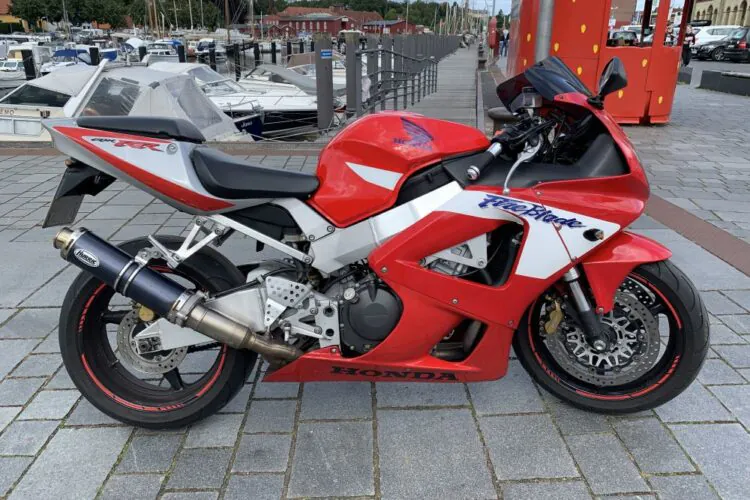

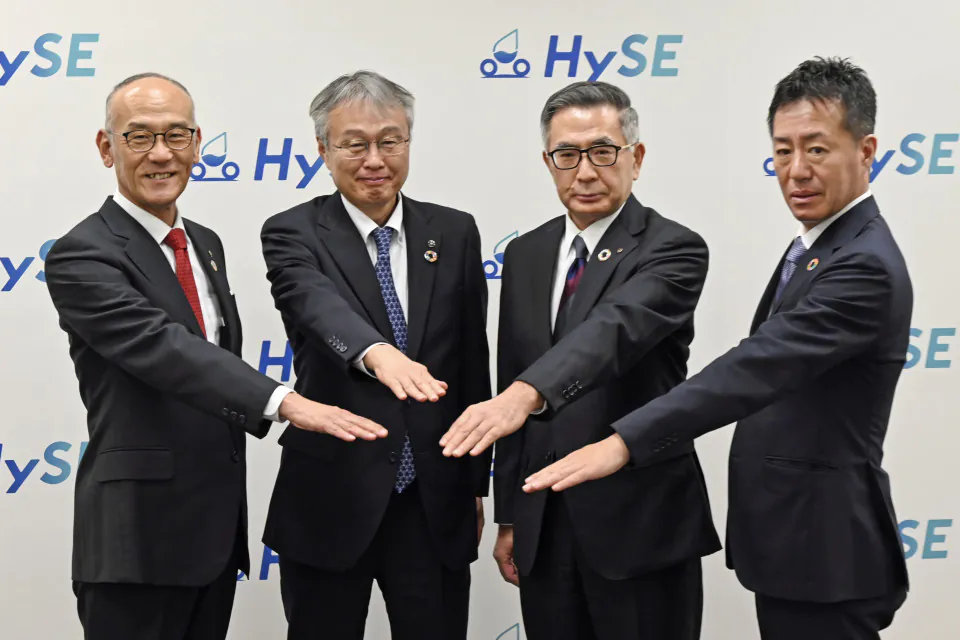
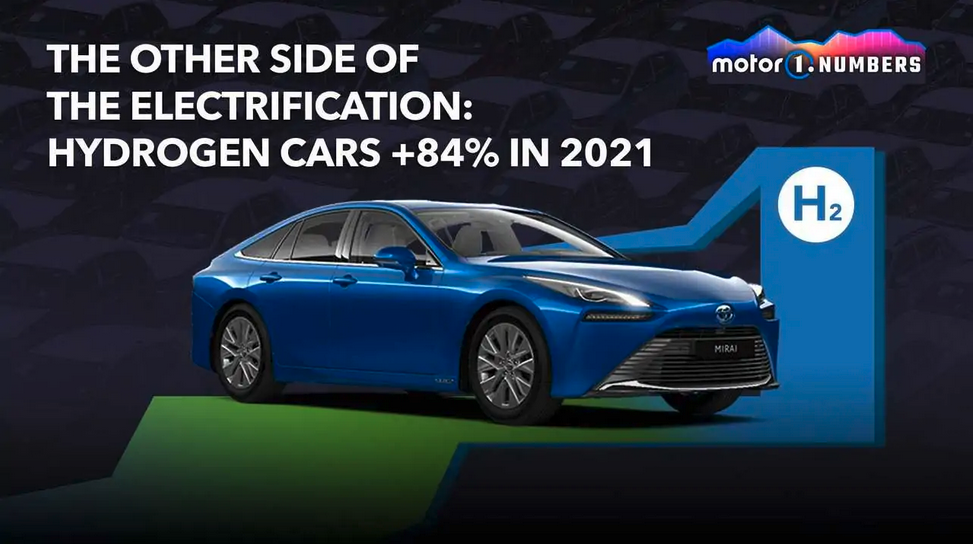





.thumb.jpeg.819bd36414116458416a25a4c7bf7c9a.jpeg)
.thumb.jpeg.cf2f13e6897758003e014a105ae7b085.jpeg)
